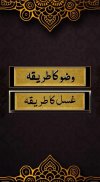






Learn Wudu & Ghusal

Description of Learn Wudu & Ghusal
Wudu & Gusal Ka Tarika:
An application for Muslim Brother and Sisters, This app contains basic information
regarding Gusal, Wadu (Wazu) and their commandments in Islam.
➔ Main features:
● Feature definition.
● Page layout step by step.
● Clear Images.
● Clarity of the application.
● Visibility layout.
It is very important for every person to make Ghusl and Wudu, In a state that
necessitates ghusl. Along with spiritual and otherworldly benefits, there are many
material advantages and good sides of ghusl and wudu. Therefore, Islam gives great
importance to Ghusl and Wudu.
When man fulfills this religious duty, he both attracts the love and consent of Allah and
gains health and welfare in material possessions.
Ghusl is also penance for minor sins.
Our Holy Prophet (PBUH) said to Anas bin Malik,
"O Anas! Exaggerate when you make ghusl. Thus, you will leave the
bathroom in a state of having been purified form your sins and faults."
Hazrat Anas said,
"O Messenger of Allah! How shall I exaggerate?" The Prophet replied,
"Wet the hair roots and eliminate the dirt from the skin."
Since the state of impurity prevents a person from worshipping Allah and it is a state of
spiritual impurity, it makes a believer uneasy, restless and depressed. It is reported in
some narrations that the earth feels disgusted by the people who walk on it while they
are impure and complains to Allah about them.
There are also narrations stating that angels of mercy will not go near impure people.
Therefore, the righteous people and the people who have taqwa have always hurried to
get rid of the state of impurity and avoided spending the whole night in the state of
impurity.
The following is stated in a hadith:
“If a person goes to bed in a state of purity (without needing ghusl and on
wudu) and his hands, feet and mouth free of dirt, give him glad tidings that
he will gain the degree of martyrdom if he dies that night.”
It is the taqwa aspect of the issue.
It does not mean that a person who is Impure brings bad luck and he is dirty and impure
materially. It cannot be said that one must not meet and speak to an impure person.
What matters is to make ghusl before the time of prayer ends if that person has not
performed that prayer. A person who needs ghusl can delay making ghusl if he does not
miss the prayer and can do anything except the things that are haram for a pure person.
That is the fatwa aspect of the issue.

























